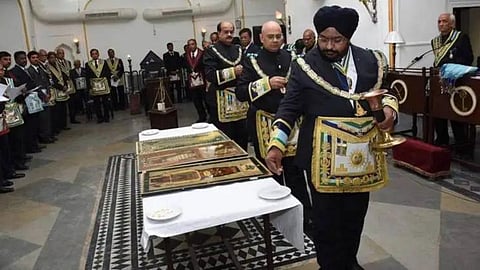
- HOMEGROWN WORLD
- #HGCREATORS
- #HGEXPLORE
- #HGVOICES
- #HGSHOP
- CAREERS
- ABOUT US
- CONTACT US

Which boy hasn’t grown up wanting to be a part of an ancient secret society surrounded by powerful allies and working collectively for the betterment of the world? I know, I have. Today, I am about to tell you about one of the most famous secret societies in the world that also happens to be India’s biggest secret society, the Freemasons. Well, their reputation of being a successful secret society will fall into jeopardy if a nobody like me can tell you all about them. However, what I am going to share with you is a combination of general knowledge, conspiracy theories and extensive research on the subject.
The origins of modern organized freemasonry can be traced back to 1717 when the Grand Lodge was established in England. However, historical records indicate the existence of Freemason societies dating back to the early 1500s. In India, there are approximately 25,000 active Freemasons, and the Grand Lodge of India was officially formed on November 24, 1961. British freemasonry had been practiced in India since the 1730s, with officers of the East India Company holding meetings in Fort William in Lodge 72. Presently, there are over 500 lodges in India, with the Grand Lodge Of India located in Park Street, Kolkata. Throughout history, India has been home to many renowned Freemasons, including presidents, business leaders, judges, maharajas, and famous actors.
So why did great men like Swami Vivekananda, JRD Tata and Motilal Nehru among others, join the Freemasons and why exactly is the society shrouded in so much mystery?
In contemporary culture, Freemasonry is recognized for its clandestine handshakes, symbolic gestures, and intricate ceremonies held in private. However, its essence extends far beyond these aspects. The core principles of Freemasonry are encapsulated in its motto: Brotherly Love, Relief & Truth. This involves providing its members or 'brothers' (it has a men-only membership policy), as they call each other and working together towards the betterment of society at large. Freemasonry aims to cultivate virtuous individuals who contribute positively to their families and communities. It involves a transformative journey that fosters moral and spiritual development while expanding intellectual horizons. The Freemasons are also involved in a lot of charity work globally.
Every Freemason will tell you that theirs is not a religious or political organization but involves believing in a spiritual entity. An atheist cannot be a Freemason. For them, it is the All-Seeing Eye, also known as the Eye of Providence or the Masonic Eye. In Freemasonry, the All-seeing eye serves as a symbol to remind members that a higher power, not limited to the Christian God but the Supreme Being in any form, is constantly observing their actions and thoughts. Some folks, particularly conspiracy theorists, associate the Masonic Eye's symbolism with the Illuminati, considered to be the most renowned and influential secret society globally.
Now, let's turn our attention to the enigmatic Freemasonic ceremonies that take place behind closed doors. Filled with symbolism, the participant seeks to understand profound ideas through repeated practice. Additionally, there is a confidential book, known as the Black Book, which contains detailed explanations of the rituals and instructions for conducting them. The level of secrecy is so high that certain words in the book are intentionally obscured or left blank, ensuring that unauthorized individuals cannot comprehend its contents if it were to fall into their hands. These concealed words can only be imparted by members who have attained a specific level or rank within the organization.
Spirituality and geometry are intricately woven in the Freemasons Society. The Freemasons, derived from the word 'Mason' in ancient times, were skilled architects with a deep understanding of geometric principles. They established a connection between spirituality and geometry, expanding their studies beyond architectural design.
Today, they pay tribute to their origins through the symbol of the square and compass, representing morality and the maintenance of boundaries and moderation. In India, buildings such as the New Delhi capital and Connaught Place incorporate Masonic elements, utilizing specific geometric shapes like the triangle and hexagram.
These designs were inspired by celestial shapes symbolizing the sun and moon, representing feminine and masculine energies. It's no coincidence that the renowned architect of the New Delhi capital, Robert Russell, was a Freemason. Additionally, Masonic elements can be found in Jantar Mantar and Rashtrapati Bhavan, with the latter bearing signs of Masonic design due to the affiliation of many British kings with Freemasonry.
If you've made it this far, I can tell that you have a tingling curiosity for secret organizations and wanting to be a part of it. How do you become a member, you ask? Well, any man, who is over 21 years of age and is not an atheist, can become a Freemason. The organization does not reach out to anyone. You must seek it out of your own free accord. However, there's a major catch. You ought to be referred by a Freemason, who must deem you worthy for a recommendation. Then the Freemasons conduct a detailed investigation on the candidate and if you fit the bill, you can be a part of this secret cult - ahem, I mean secret society.
If you enjoyed reading this, here's more from Homegrown:
How A Czechoslovakian Footwear Company Became Synonymous With Bengali Households
Inside Putulbari: Unravelling The Dark History Of Kolkata's House Of Dolls
How Tagore Reimagined Rakhsha Bandhan To Unite Hindus & Muslims During The Partition Of 1905
